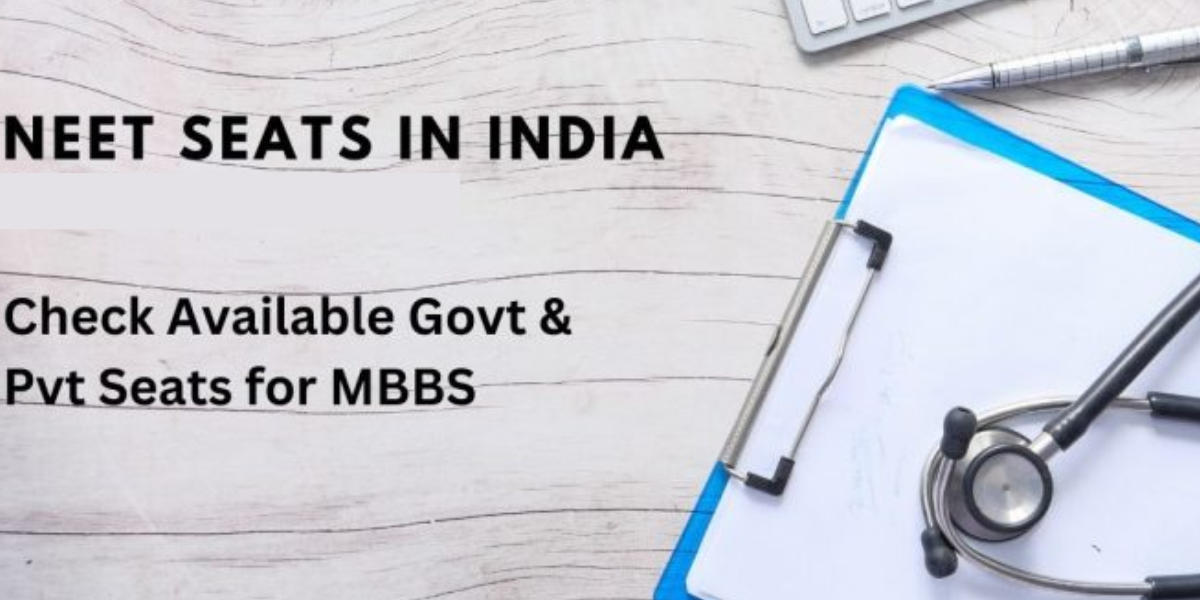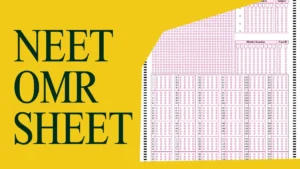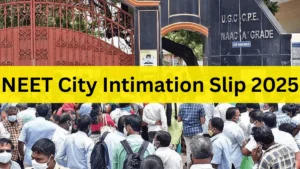Table of Contents
We know that in every year, more than a 2 million students appear for the NEET UG exam, but the number of MBBS and BDS seats available are very limited. It is important for candidate to have an idea of with how many candidates they are competing for a single seat. Knowing about NEET seat matrix 2025 presents a better picture to students in order to perform well in the upcoming NEET UG 2025 exam.
This is why we have provided you with all the related information about NEET UG Seat matrix 2025 here. If you want to know how many MBBS and BDS seats are up for grabs through NEET UG 2025, then please read this article entirely for it.
NEET Seat Matrix 2025
The accurate NEET seat matrix 2025 will be released by the Medical Counselling Committee (MCC) before the counselling process begins. However, the data from the previous year is almost accurate and some increase in these seats can be expected. The NEET cutoff scores establish admission criteria for several programs, including 91,415 MBBS seats, 1205 AIIMS MBBS seats, 200 JIPMER MBBS seats, 27,948 BDS seats, 52,720 AYUSH seats, 487 BSc Nursing seats, and 603 BVSc seats.
Total Medical Seats in India Through NEET UG
Candidates preparing for National Eligibility Entrance Test (NEET) must know the state-wise NEET seat matrix to set their goals straight. The Medical Counselling Committee (MCC) will formally reveal the seat matrix for NEET 2025 after the NEET Results are released. The NEET UG 2025 is scheduled on May 04, 2025.
| Parameters | Details |
| The total number of MBBS seats available in India | Approximately 100,000+ in 2024-2025 |
| The total number of BDS seats available in India | Approximately 28000+ in 2024-2025 |
| Parameters of NEET seat allotment | The candidate’s rank, the category they belong to, and the availability of seats in their preferred college and course. |
| The different categories of reserved seats in NEET | SC (Scheduled Castes) |
| ST (Scheduled Tribes) | |
| OBC (Other Backward Classes) | |
| EWS (Economically Weaker Sections) | |
| The state with the highest number of NEET seats | Karnataka, with approximately 9,500 MBBS seats and 1,500 BDS seats |
| The state with the lowest number of NEET seats | Manipur, with approximately 350 MBBS seats and 50 BDS seats |
NEET UG Seat Matrix 2025
Candidates asking about How Many Seats are There in NEET should know that there are approximately 101188 MBBS seats available in medical colleges across India. Also, around 4500 seats are likely to be added in the coming session. The 15% All India Quota (AIQ) seats and the 85% State Quota NEET seats are counseled independently. Four sessions of NEET Counselling are expected for the 2025 academic year; additional rounds may be announced based on the availability of vacant NEET UG seats.
|
NEET Seat Matrix 2025
|
|
|
Colleges
|
Number of MBBS Seats
|
|
Government Colleges
|
41,388 MBBS seats
|
|
Private Colleges (including Deemed Universities)
|
35,540 MBBS seats
|
|
Total Seats through NEET
|
76,928
|
|
AIIMS (Delhi)
|
1205 MBBS seats
|
|
JIPMER
|
200 MBBS seats
|
|
Total MBBS seats in India
|
1,06,333
|
Total MBBS Seats in India 2025: State Quota NEET Seats
A certain percentage of NEET seats in medical colleges are reserved for candidates who are residents of the respective state. This is known as the state quota. We have listed the numbers of the medical colleges in each state with number of government medical seats available in each state:
| States in India | Available Medical Colleges | MBBS Seats Available |
| Andhra Pradesh | 22 medical colleges | 4,350 Seats Available |
| Arunachal Pradesh | 2 medical colleges | 300 Seats Available |
| Assam | 6 medical colleges | 1,100 Seats Available |
| Bihar | 11 medical colleges | 1,950 Seats Available |
| Chhattisgarh | 9 medical colleges | 1,575 Seats Available |
| Goa | 1 medical college | 180 Seats Available |
| Gujarat | 17 medical colleges | 3,365 Seats Available |
| Haryana | 6 medical colleges | 1,080 Seats Available |
| Himachal Pradesh | 6 medical colleges | 880 Seats Available |
| Jammu and Kashmir | 5 medical colleges | 850 Seats Available |
| Jharkhand | 3 medical colleges | 510 Seats Available |
| Karnataka | 58 medical colleges | 9,420 Seats Available |
| Kerala | 10 medical colleges | 1,800 Seats Available |
| Madhya Pradesh | 14 medical colleges | 2,675 Seats Available |
| Maharashtra | 50 medical colleges | 7,950 Seats Available |
| Manipur | 2 medical colleges | 250 Seats Available |
| Meghalaya | 1 medical college | 50 Seats Available |
| Mizoram | 1 medical college | 100 Seats Available |
| Nagaland | 1 medical college | 50 Seats Available |
| Odisha | 12 medical colleges | 2,100 Seats Available |
| Punjab | 10 medical colleges | 1,530 Seats Available |
| Rajasthan | 15 medical colleges | 3,125 Seats Available |
| Sikkim | 1 medical college | 100 Seats Available |
| Tamil Nadu | 42 medical colleges | 7,890 Seats Available |
| Telangana | 9 medical colleges | 1,755 Seats Available |
| Tripura | 1 medical college | 100 Seats Available |
| Uttar Pradesh | 42 medical colleges | 8,040 Seats Available |
| Uttarakhand | 5 medical colleges | 810 Seats Available |
| West Bengal | 24 medical colleges | 4,475 Seats Available |
How Many Government Seats are There in NEET
Here is the list of statewide govt medical colleges in India in the below table with their seat intake:
|
Name of State/Union Territory
|
No. of Seats | No. of Colleges | ||
| Andaman & Nicobar Islands | 112 | 1 | ||
| Andhra Pradesh | 2360 | 12 | ||
| Arunachal Pradesh | 50 | 1 | ||
| Assam | 900 | 6 | ||
| Bihar | 1140 | 9 | ||
| Chandigarh | 150 | 1 | ||
| Chhattisgarh | 770 | 6 | ||
| Delhi | 1115 | 7 | ||
| Goa | 180 | 1 | ||
| Gujarat | 3750 | 17 | ||
| Haryana | 710 | 5 | ||
| Himachal Pradesh | 720 | 6 | ||
| Jammu & Kashmir | 885 | 7 | ||
| Jharkhand | 680 | 6 | ||
| Karnataka | 2900 | 19 | ||
| Kerala | 1455 | 9 | ||
| Madhya Pradesh | 1970 | 13 | ||
| Maharashtra | 4280 | 24 | ||
| Manipur | 225 | 2 | ||
| Meghalaya | 50 | 1 | ||
| Orissa | 1150 | 7 | ||
| Pondicherry | 180 | 1 | ||
| Punjab | 600 | 3 | ||
| Rajasthan | 2600 | 14 | ||
| Tamil Nadu | 3650 | 26 | ||
| Telangana | 1740 | 10 | ||
| Tripura | 125 | 1 | ||
| Uttar Pradesh | 3250 | 24 | ||
| Uttarakhand | 425 | 3 | ||
| West Bengal | 3000 | 18 | ||
The total number of seats available in government medical colleges through the National Eligibility cum Entrance Test (NEET) varies each year due to changes in the number of colleges and the seats they offer. As of the most recent information available in 2024, the approximate number of MBBS seats in government medical colleges in India is around 50,000 to 55,000. This includes seats in both central and state government medical colleges.
For the most accurate and updated information, you should refer to the official NEET (NTA) website or the Medical Counselling Committee (MCC) website, as they provide detailed and current seat matrices for each academic year.
NEET Seat Matrix 2025- Reservation Policy
In order to promote social justice and provide equal opportunities to all, NEET seats in medical colleges are reserved for candidates belonging to different categories such as SC (Scheduled Castes), ST (Scheduled Tribes), OBC (Other Backward Classes), and EWS (Economically Weaker Sections). The percentage of seats reserved for each category varies from state to state and college to college. For instance, in central government medical colleges NEET seats reservation system is listed below
| Reservation | Statistics |
| for SC candidates | 15% |
| for ST candidates | 7.50% |
| OBC candidates | 27% |
| for EWS candidates | 10% |
Similarly, state government medical colleges have their own reservation policies.
NEET Seat Matrix 2025- Allotment of Seats
After the NEET results are declared, candidates who have qualified the exam are required to register for counseling and seat allotment. The process of seat allotment is carried out by the Medical Counseling Committee (MCC) for central government medical colleges and the respective state counseling authorities for state government medical colleges. The process of seat allotment is based on the candidate’s rank, category, and the availability of seats in their preferred college and course. The counseling process is conducted in multiple rounds until all the seats are filled.
NEET Seat Matrix 2025: Fee Structure Based on College Type
We have mentioned the NEET Seats and their possible Fee Structure below-
NEET Fee Structure in Government Medical Colleges
The fee structure for NEET seats in government medical colleges is relatively low and affordable. The tuition fee for MBBS courses in government medical colleges ranges from Rs. 10,000 to Rs. 1 lakh per annum, depending on the state and the college. In addition, government medical colleges may charge additional fees for hostel, mess, library, and other facilities, which typically range from Rs. 10,000 to Rs. 30,000 per annum.
NEET Fee Structure in Private Medical Colleges
The fee structure for NEET seats in private medical colleges is significantly higher compared to government medical colleges. The tuition fee for MBBS courses in private medical colleges ranges from Rs. 5 lakh to Rs. 25 lakhs per annum, depending on the college and the course. In addition, private medical colleges may charge additional fees for a hostel, mess, library, and other facilities, which typically range from Rs. 1 lakh to Rs. 3 lakhs per annum.
NEET Fee Structure in Deemed Universities
Deemed universities are autonomous institutions that are recognized by the University Grants Commission (UGC). The fee structure for NEET seats in deemed universities is higher compared to both government and private medical colleges. The tuition fee for MBBS courses in deemed universities ranges from Rs. 20 lakhs to Rs. 1 crore per annum, depending on the college and the course. In addition, deemed universities may charge additional fees for a hostel, mess, library, and other facilities, which typically range from Rs. 1 lakh to Rs. 5 lakh per annum.
Impact of NEET Seat Matrix 2025 on Cut off
The National Eligibility cum Entrance Test (NEET) is a highly competitive exam in India, with lakhs of students appearing for the exam every year. To secure a seat in a medical college, candidates must not only clear the NEET exam but also score above the cut-off score. The NEET cut-off score is the minimum score required to qualify for admission to medical colleges.
The cut-off score for NEET is determined based on various factors such as the difficulty level of the exam, the number of candidates who appeared for the exam, and the number of seats available in medical colleges. The cut-off score varies every year, and candidates must score above the cut-off score to be eligible for counseling and seat allotment.
In recent years, the cut-off scores for NEET have been relatively high, with candidates requiring a score of around 600-700 out of 720 to qualify for admission. This has led to increased competition and pressure on students to score high in the exam.





 NEET OMR Sheet 2025, Common Mistakes to ...
NEET OMR Sheet 2025, Common Mistakes to ...
 NEET Total Registration 2025 vs 2024- De...
NEET Total Registration 2025 vs 2024- De...
 NEET City Intimation Slip 2025 Release D...
NEET City Intimation Slip 2025 Release D...

